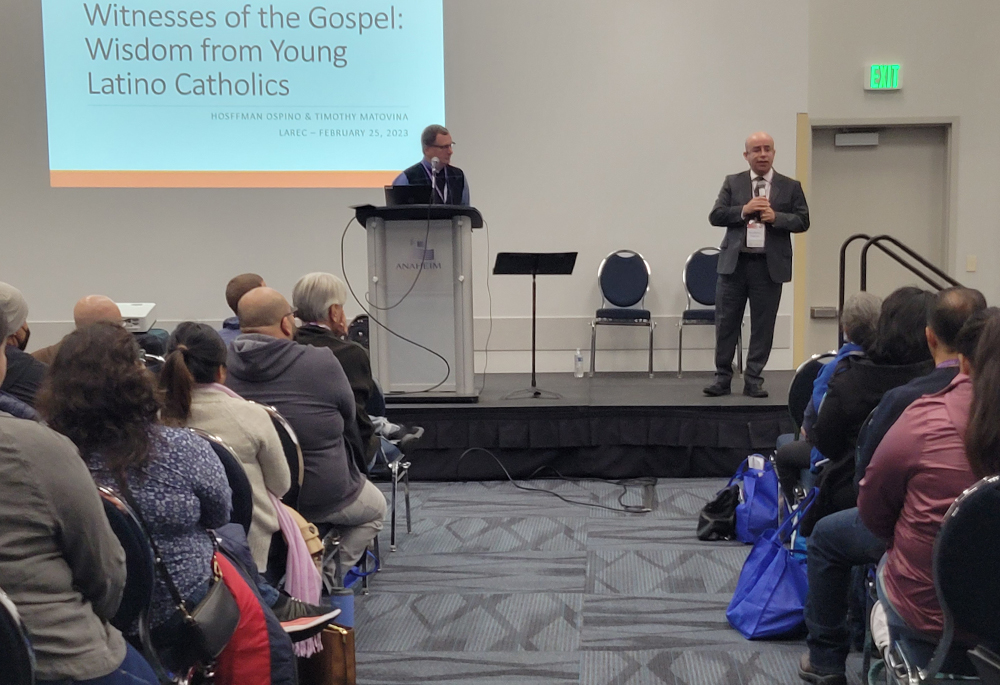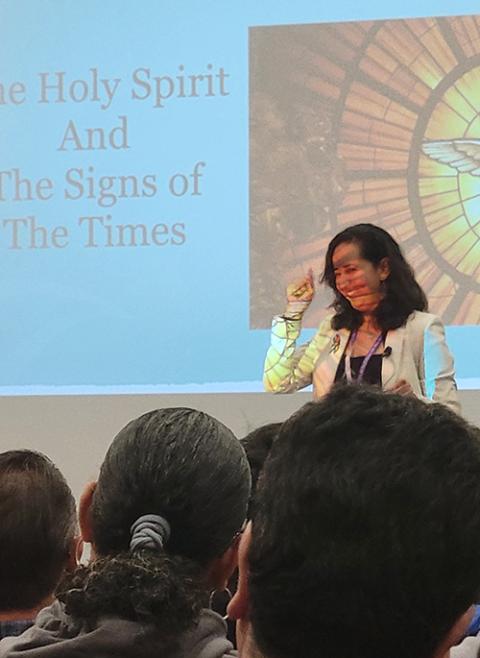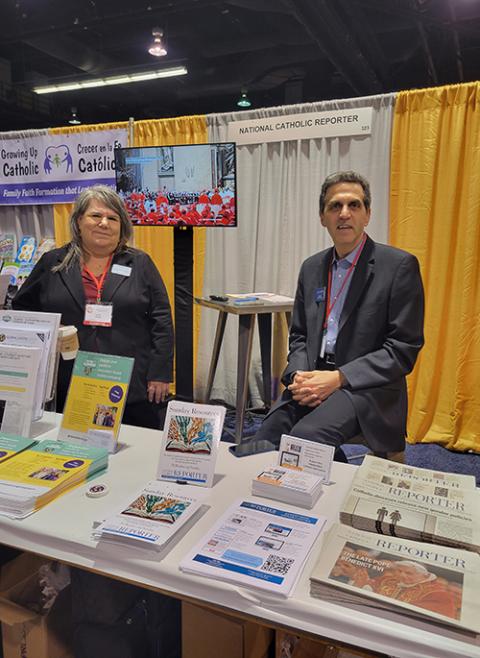
Timothy Matovina, left, and Hosffman Ospino give a workshop on ministry for young Latinos and Latinas during the Los Angeles Religious Education Congress Feb. 25 in Anaheim, California. (NCR photo/Heidi Schlumpf)
The Los Angeles Religious Education Congress used to bill itself as the largest annual gathering of Catholics in the United States. But over the years attendance had dropped from the highs of 30,000 to 40,000 people to about half that — and that was before COVID-19. Similarly, there was a general sense that it wasn't as "progressive" as it once had been, especially after the appointment of Archbishop José Gomez in 2011.
But after attending this year's Congress — my first in almost two decades — I found evidence to the contrary. Not only did hundreds of NCR readers and fans stop by our booth with praise for our work, but a number of regular NCR writers were on the schedule as workshop presenters.

Yunuen Trujillo at her workshop on inclusive ministry for LGBTQ Catholics during the Los Angeles Religious Education Congress in Anaheim, California (NCR photo/Heidi Schlumpf)
Yunuen Trujillo, an NCR contributor since 2020, spoke to a sold-out crowd on "LGBTQ Catholics and Ministry Inclusivity in Our Parishes Today." That crowd gave her a standing ovation after she shared her own experiences as a gay Catholic, including harassment she received online after posting a prayer for LGBTQ Catholics.
"There is a lot of hurt, and that hurt has to be at the center of our efforts to make our church more inclusive," said Trujillo, author of LGBTQ Catholics: A Guide to Inclusive Ministry. She is also a volunteer Spanish-language religious formation coordinator with the Catholic Ministry with Lesbian and Gay Persons of the Archdiocese of Los Angeles.
She countered the myth that "there's no such thing as a gay Catholic" with her own experience: "I am gay and I am Catholic. … We are part of the body of Christ and we are present at all levels of church and in all parts of the world."
Encouraging parish ministers to listen to LGBTQ Catholics with humility, Trujillo also reminded them that "ministry is service, and that service should be based on the specific needs, as expressed by the person being served."
She also urged "pastoral sensitivity," noting that too often church teaching on chastity is applied "discriminately." Chastity is more than abstinence; it's the integration of sexuality within the person, she said, and all are called to chastity, including heterosexual people.
Trujillo ended her talk (which she gave in Spanish earlier in the conference) on a hopeful note, reminding attendees that "the Holy Spirit is going to continue moving the church in a more inclusive direction long after we're gone."
NCR contributor Hosffman Ospino of Boston College was joined by Timothy Matovina of the University of Notre Dame in co-presenting a workshop on "Witnesses of the Gospel: Wisdom from Young Latino Catholics."
The workshop featured powerful video testimonies from young Latino Catholics, who shared stories of being harassed at the border, being told they are not "college material" and of success despite obstacles such as the death of parent.
Ospino noted that most Latino ministries are intended for immigrants, but that the majority of young Hispanics are born in the United States. "We need to listen to young Latinos and Latinas, but they are not in our churches," he said. To reach them on social media, he said, older ministers should empower younger people to minister online.
Advertisement
That these two workshops were led by Latinos is not surprising. In 2018, archdiocesan officials told NCR that nearly three-quarters of the Los Angeles Archdiocese's about 5 million Catholics were estimated to be of Latino or Hispanic background. In the convention hallways and escalators, Spanish was more frequently heard than English. The music and liturgies also reflected the diversity of the archdiocese and U.S. Masses reflected Black, Vietnamese, Latino and Celtic cultures. Some workshops were offered in Vietnamese or Spanish.
Several workshops addressed women's issues. Phyllis Zagano, whose column is published in NCR, spoke about women deacons in a workshop titled, "Just Church: Catholic Social Teaching, Synodality, and Women." Ellie Hidalgo of Discerning Deacons and Karen Luna of the L.A. Archdiocese's Young Adult Ministry spoke on "Unleashing the Gifts of Women for a Synodal Church." In both workshops, audience members asked questions that reflected a desire for more women's leadership in the church.

Laure Krupp and Joe Ferullo staff NCR's booth at LA Religious Education Congress. (NCR photo/Heidi Schlumpf)
That was also the case at a workshop on women's leadership presented by Carolyn Woo, former president of Catholic Relief Services. Woo cited statistics about high percentages of women leaders in church ministries and organizations that disprove the assertion that women leaders are an oxymoron or tokens in the church.
But she admitted there were challenges. "The most heartbreaking stories of women's leadership not being valued and respected are in parishes," she said, noting that larger workplaces have more accountability.
"There is no doubt that women are outsiders in church organizations," said Woo, the author of Rising: Learning from Women's Leadership in Catholic Ministries, who called for improved seminarian training and formation so priests can better work with women in parishes.
Additional NCR writers, columnists and contributors who gave workshops at Congress included Jesuit Fr. Thomas Reese, Robert Wicks, Br. Mickey McGrath and Judith Valente.
Organizers estimated that 10,000 people attended the "Adult Days" of the conference, with another 5,000 on the "Youth Day." There was a bit of a heaviness to the event, given the death of Auxiliary Bishop David O'Connell, who had been shot and killed a week earlier.
And it's true that other speakers represented more conservative points of view, and some more traditionalist groups had a presence in the exhibit hall. Yet the event had a "here comes everybody" vibe. It felt very catholic, lowercase "c."





